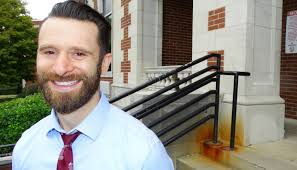11.17.21Charlie Friedman on Leading During a Difficult Time

Friedman (in simpler, maskless times)
Over the past month, we’ve been sharing resources that we hope have provided teachers and leaders with support in tackling many of the challenges of schooling right now. We’ve also been doing some learning ourselves, reaching out to partners in the field to understand how they’ve been approaching this unique time. We’re grateful to Charlie Friedman, Founder and Head of School at Nashville Classical Charter School, for providing his insight and we’ve shared his thoughts below. We’ve partnered with Charlie and his teachers for the past three years as valuable piloters of our Reading Reconsidered Curriculum. We’ve learned a ton from working with him and you’ll see why from his insights below, shared with us in a conversation with Hannah Solomon and shared on to you in the hopes that they will provide you with ideas and perspective to get through difficult times. We’re grateful to Charlie for sharing his wisdom, especially at a time when there aren’t many clear answers.
What challenge has most surprised you since the start of this school year?
I think that emotional complexity of the school year has been the biggest challenge. One example: we all agree that school should be open and every kid should be in school, but there is a true emotional tear when there is a positive case, when there’s been exposure, when there is a need to quarantine. It reminds you of the complexity of, on the one hand, knowing the right thing to do, but on the other it’s not simple to do it.
What I did not anticipate is that you get notified of a positive COVID case on a Friday afternoon or a Sunday morning – not normal business hours. Then you have to spring into action Sunday at 3pm and it’s just different. It feels like you are on call all the time as a school leader, which isn’t entirely usual for this position. Many of us have families and other commitments, so we had to make some adjustments to try to preserve our balance.
It has taught us how important it is to have a team of people to make these decisions about how to proceed. One lesson learned is that we don’t need 100% consensus (from the four leaders involved in process decisions like this at Nashville Classical) because we don’t want you to have to drop everything to get on a phone call while you are spending time with your kids.
What was an “aha” moment that helped you reframe how you’re approaching the year?
Two things, and I’m being a little vulnerable and transparent. First, seeing our achievement data when we returned in person. We have an economically and racially diverse school community and our Black and Hispanic students fell significantly further behind than before the pandemic. There was 5-6% gap in achievement in fall of 2020 and that grew to 16% by the time we returned to school.
We had a pretty good virtual program and we worked really hard to do everything we could to support it. So this data, which was really hard, made me realize that we should be going all in on accelerating learning for kids who are in school. We need to view this as a multi-year journey to fill and address those gaps. If kids need to miss days (because they are sick or because quarantine) then we can’t ask teachers to drop everything and become hybrid teachers. We need them to focus their energies on in-person learning and acceleration, because the data say that the virtual program was not effective.
What tips or strategies have been the biggest game-changer for you (or for the teachers you support) this year?
We had three people resign in the first 30 days which felt a little outside of the norm for us. I think this was both because we hired virtually, so they didn’t know us as well, and also as a result of how high stress things were at the time of re-opening. Two of the three worked with kindergarten kids, and those kids are less used to school while their parents are also experiencing a lot of pressure and anxiety about what their children missed.
Then, because of symptom monitoring, 50% of our teachers took at least one day off because of a COVID system. Combining these two factors with normal staff absences, we had to rethink coverage and expand our sub pool dramatically.
Lizzie Eisen, our School Principal, and Arshia Saiyed, our Director of Talent and External Affairs came up with an effective and creative solution. We brought in a cohort of parents, some volunteered and others we recruited, and did a four hour training on Strong Voice, Positive Framing, and What To Do Directions. Literally we asked ourselves “what are the essentials to help them teach and cover” and we told them it would probably help them parent too! We mostly use them for pre-planned absences. It can’t be the only arrow in your quiver, but it’s been really successful.
We’ve also worked hard to limit complexity whenever possible. We haven’t tried to pre-think and prepare for every possible version of every scenario; we haven’t tried to do hybrid teaching. Instead, we try to anchor ourselves in our purpose. The purpose of this year is for our school to remain open and for us to begin the long and important process of accelerating learning for all of our students.
